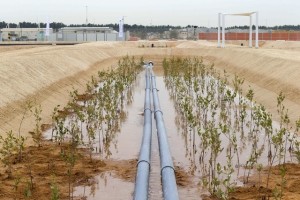
The world’s first research facility to grow both food and fuel, using desert lands irrigated by seawater, began operations this week on a 2-hectare site in Abu Dhabi, United Arab Emirates. Operated by Masdar Institute, the facility, is funded by the Sustainable Bioenergy Research Consortium (SBRC), a group advancing the aviation industry’s commitment to reduce its carbon emissions by developing a clean, sustainable and alternative fuel supply.
“We live in a resource-constrained world where the access to energy, water and food are interlinked,” said Dr. Behjat Al Yousuf, Interim Provost of Masdar Institute, a research-based university in Abu Dhabi, and a founding member of SBRC. “Public-private collaboration to support cutting-edge research is needed to ensure that rising populations and industry can flourish sustainably, while, at the same time, also protect our finite resources. This project has the potential to turn resource scarcity on its head.”
“By doing research on integrated food and energy systems, we can begin to explore how the cultivation of biomass contributes to feeding the planet, preserving fresh water supplies and delivering cleaner, more sustainable fuels,” said Dr. Al Yousuf. “This research is very relevant for the UAE and all freshwater- and arable land-constrained countries.”
Aquaculture – industrial fish or shellfish farming – is one of the world’s fastest expanding food sectors, with a current growth rate of about 6% a year. While aquaculture systems can reduce a nation’s dependence on foreign food and improve security, they pose environmental challenges due to the impact of nutrient-rich effluents flowing into the ocean. The SBRC tackles these concerns and is seeking to minimize the footprint of commercial farming practices.
The research facility uses coastal seawater to raise fish and shrimp for food, whose nutrient-rich wastewater then fertilizes plants rich in oils that can be harvested for aviation biofuel production. The salt-tolerant halophyte plants – whose commercial potential is relatively unexplored – thrive in arid, desert conditions and don’t require fresh water or arable land to grow. In the last step of the system, the wastewater is diverted into a cultivated mangrove forest, further removing nutrients and providing valuable carbon storage, before the naturally-filtered and treated effluent is discharged back into the sea.


